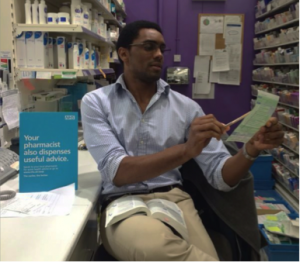February 2, 2015, by paxnh1
An insider’s look at a Centre for Doctoral Training
When I first thought about doing a PhD, I had no idea there were so many different things to consider: country, university, school, academic group, funding, research area… this list goes on and could probably be a publication in itself. Everyone stressed the importance of picking the right topic, and I found, not surprisingly, this was the hardest bit to do. So, as most people would do in this moment of confusion and soul searching, I turned to Google.
I eventually found there was a new category to consider – route. I could either a) do a 3-4 year PhD in a specific topic from the outset, or b) enrol at a Centre for Doctoral Training (CDT) for 4 years. In short, the CDT route involves spending the first half a year or so doing two or three training projects in what will most likely be new disciplines. After this, one picks a PhD topic from a list of projects relating to theme of the CDT. Although the PhD topics aren’t necessarily guaranteed, and so this route could be seen as a bit risky, it seemed perfect for me. I genuinely liked pharmaceutical science but I hadn’t seen enough of the lab to know which discipline I wanted to “master”. Thus, I researched no further into other PhD routes and dived head first into the CDT in Targeted Therapeutics, hoping I would discover what my science spirit was (and indeed, I did).
I find whenever I’m asked if I would take the plunge again, after immediately saying yes, I give the same three reasons:
1) The short training projects are actually training projects.
In the first six months, I had the chance to do two 3 month projects in topics my CV would probably not have qualified me for in competitive circumstances. Indeed, this would have been for good reason as at the beginning of both projects I was incredibly clueless and undoubtedly hazardous. Nevertheless, I was very lucky to be immersed in such an environment for the sole purpose of learning. Although every academic supervisor wants results, I found the only expectation put on me was to learn as much as I could. On that, I definitely delivered. My research, on the other hand, was “inconclusive”. Yet, I so enjoyed the experience of my first training project that I ended up selecting a PhD project that involved using the same techniques. It worked out to be a really nice stepping stone from my pharmacist background!

2) We get to practise presenting, a lot.
I often hear how essential of a skill it is to be able to communicate your scientific research and ideas with others. Like many others, when I was an undergraduate, it took several days of courage building and preparation before I was able to stand up to speak in front an audience. After joining the CDT, I was required to give a “greater than expected” number of oral and poster presentations as part of the centre’s colloquiums, particularly in my first year. Although it was unpleasant initially, its made my colleagues and I the kind of PhD students who can get up in front of a room of 100+ experts and strangers and present a viable business plan for a hypothetical medicine without breaking a sweat… of course, wearing matching suits and ties.

3) Making friends with scientific benefits.
When I turned up on my first day, I sincerely thought I would be in a centre full of pharmacists – this is after all the School of Pharmacy right? Completely erroneous. Pharmacy is actually a highly multidisciplinary field and it seems the CDT takes full advantage of that. I’m in the same programme as students with chemistry, physics, pharmacology, biotechnology and biochemistry degrees. Since it’s such a scientific melting pot, we all end up analysing problems differently and coming up with different whacky solutions. This level of bonding really reflects in our ability to take excellent group shots…

Ultimately, I’m still doing a PhD just like other students who picked the direct route. There are other advantages (e.g. well-funded projects with strong industrial links) and of course disadvantages (e.g. the training projects take time away that could be spent on an actual PhD project). Honestly, if I had known exactly what field I would have liked to “master”, I probably I wouldn’t have applied to the CDT. However, I recently realised its practically impossible to master any field in the space of 3-4 years as a PhD student. So might as well broaden your horizons before they start calling you Dr!
About the blogger
Naim Hage is a final year PhD student in the Centre for Doctoral Training in Targeted Therapeutics. He did his undergraduate degree in Pharmacy and now specialises in molecular and structural biology / nanotechnology.
No comments yet, fill out a comment to be the first


Leave a Reply